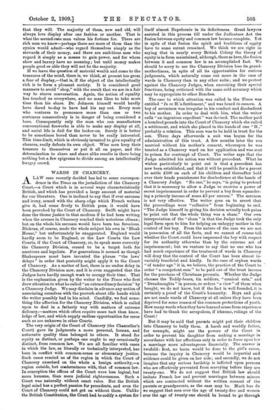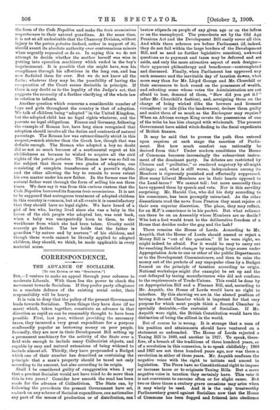WARDS IN CHANCERY.
ALAW case recently decided has led to some correspon- dence in the Times on the jurisdiction of the Chancery Court,—a Court which is in several ways characteristically British, and which has provided a large amount of material for our literature. One is inclined to say that if ever sarcasm and irony, armed with the sharp edge which French writers give it, had come freely to British pens, it would have been provoked by the Court of Chancery. Swift might have done the theme justice in that medium if he had been writing when the arrears in Chancery reached their notorious climax; but on the whole his sarcasm would have been too ferocious. Dickens, of course, made the whole subject his own in "Bleak House,"• but unfortunately he exaggerated. England would hardly seem to be England, or the Law Courts the Law Courts, if the Court of Chancery, or, to speak more correctly the Chancery Division, ceased to be a target both for amateurs and legalists. For generations it seemed as though Shakespeare must have invented the phrase "the laws' delays" in order that posterity might apply it to the Court of Chancery. As a matter of fact, there is no undue delay in the Chancery Division now, and it is even suggested that the Judges have hardly enough work to occupy their time. That is the explanation given by the writer to the Times who first drew attention to what he called "an extraordinary decision" by a Chancery Judge. We may disclaim in advance any notion of associating ourselves with the proverb about idle hands which the writer possibly had in his mind. Candidly, we feel some- thing like affection for the Chancery Division, which is called upon to deal in a fatherly way with matters of extreme delicacy,—matters which often require more tact than know.. ledge of law, and which supply endless opportunities for error such as are unknown in other Courts.
The very origin-of the Court of Chancery (the Chancellor's Court) gave its judgments a more personal, human, and autocratic quality than belonged to others. It stood for equity as distinct, or perhaps one ought to say occasionally distinct, from common law. We are all familiar with cases in which the law, as literally or technically interpreted, has been in conflict with common-sense or elementary justice. Such cases remind us of the region in which the Court of Chancery exercised on the whole a benign authority,—a region outside, but conterminous with,. that of common law. In conception the offices of the Court were less logical, but more humane, than mere judicial righteousness. Such a Court was naturally without exact rules. But the British legal mind has a perfect passion for precedents, and even the Court of Chancery could not get on without them. 'Unlike the British Constitution, the Court had to codify a system for itself almost Napoleonic in its definiteness. Great lawyers assisted in this process till under the Judicature Act the fusion between equity and common law became complete. Yet in spite of that fusion the spirit and traditions of evity have to some extent remained. We think we are right in saying that in nearly every British Colony the theory of equity is in form maintained, although, there as here, the fusion between it and common law is an accomplished fact. We should be sorry to see the Chancery Division lose its grand. motherliness, in spite of all its opportunities for curious judgments, which naturally come out more in the case of wards in Chancery than in any other suits ; and we protest against the Chancery Judges, when exercising their special functions, being criticised with the same cold accuracy which may be appropriate to other Benches.
The case to which attention was called in the Times was entitled "In re H.'s Settlement," and was heard in camera. A. boy of seventeen was irregular in his conduct and disobedient to his mother. In order to deal with him, what the writer calls "an ingenious expedient" was devised. The mother paid a hundred pounds into the Court of Chancery which she called a settlement, and which she placed in the hands of one "H.," probably a relation. This sum was to be held in trust for the son. Three days afterwards a suit was begun for the administration of this trust. A few months later the son married without his mother's consent, whereupon he was treated as a Chancery ward on her application and was sent to prison for contempt of Court. The writer says that the Judge admitted his action was without precedent. What he wishes particularly to point out is that a precedent has now been established, and that it will be possible for a parent to settle 2100 on each of his children and thereafter hold over their heads punishment for disobedience at the hands of a Chancery Judge. "No one," he says, "is going to pretend that it is necessary to allow a Judge to exercise a power of secret imprisonment in order to prevent a boy from squander- ing a princely income of some £3 per annum." The sarcasm is not very effective. The writer goes on to assert that the proceedings were " collusive " from beginning to end. "The Judge himself in giving his decision actually took pains to point out that the whole thing was a sham." Our own interpretation of the " sham " is that the Judge took the only legal form open to him for helping an unhappy mother in the control of her boy. From the nature of the case we are not in possession of all the facts, and we cannot of course tell whether the Court could have impressed the boy with respect for its authority otherwise than by the extreme act of imprisonment; but we venture to say that no one who has had much experience of the treatment of wards in Chancery will deny that the control of the Court has been almost in- variably beneficial and kindly. In the case of orphan wards "of tender age it is, we believe, the practice of the Court to order "a competent sum" to be paid out of the trust income for the purchase of Christmas presents. Whether the Judge chooses the Teddy-bears, tin soldiers, "comical cats," and " Dreadnoughts " in person, or orders "a view" of them when bought, we do not know, but if the fact is well founded, it is certainly a proof of the Court's humanity. , Boys and girls are not made wards of Chancery at all unless they have been deprived for some reason of the common protections of youth. How many wards when they have learned sense from experience have had to thank the scrupulous, if irksome, rulings of the Court !
But it may be said that parents might put their children into Chancery to bully them. A harsh and worldly father, for example, might use the powers of the Court in order to prevent his daughter from making a marriage in accordance with her affections only in order to force upon her a marriage more advantageous financially. The answer is
twofold: first, no harm would be done to the girl's cause, because the inquiry in Chancery would be impartial and
evidence could be given on her side ; and secondly, we do not imagine that any serious hardship is inflicted upon persons who are effectively prevented from marrying before they are twenty-one. . We do not suggest that British law should imitate French law and prevent marriages between minors which are contracted without the written consent of the parents or grandparents, as the case may be. Much less do we suggest that men over the age of twenty-five and women over the age of twenty-one should be bound to go through the form of the Code Napoleon and make the trois soumissions respectueuses to their natural guardians. At the same time, k is not at all undesirable that the Chancery Division, without injury to the patria potestas (indeed, rather in support of it), should assert its absolute authority over contumacious minors when urgently requested co do so. In saying this we do not attempt to decide whether the mother herself was wise in putting into operation machinery which ended in the boy's imprisonment. It is possible that she might have.won his compliance through his affections in the long run, and has now forfeited them for ever. But we do not know all the facts ; whatever they may be, the possibility of having the co-operation of the Court seems desirable in principle. If there is any doubt as to the legality of the Judge's act, that suggests the necessity of a further clarifying of the whole law in relation to infants.
Another question which concerns a considerable number of toys and girls throughout the country is that of adoption. We talk of children being "adopted " in the United Kingdom, but the adopted child has no legal rights whatever, and the parents no legal obligations. France and Germany, following the example of Roman law, have long since recognised that adoption should involve all the duties and contracts of natural parentage. The Roman law was extraordinarily strict in this respect,—much stricter than the Greek law, though that was definite enough. The Roman who adopted a boy no doubt did so not so much because of a sentimental regret at his childishness as because he wished to acquire all the civil rights of the patria potestas. The Roman law was so full on the subject that there were two grades of adoption, one consisting of complete transference of a parent's rights, and the other allowing the boy to remain to some extent his own master under his new father. In the former case the natural father went through the form of selling his son three times. We dare say it was from this curious custom that the Code Napoleon borrowed its famous trois sounassions. It is not to be supposed that outrageous treatment of adopted children in this country is common, but at all events it is unsatisfactory that they should have no legal rights. We have heard of a girl of ten who, having lived since she was a baby in the Louse of the rich people who adopted her, was sent back, when a baby was unexpectedly born to them, to the workhouse from which she had been taken. Cruelty could scarcely go farther. The law holds that the father is guardian" by nature and by nurture" of his children, and though these words cannot be literally applied to adopted children, they should, we think, be made applicable in every material sense.



























































 Previous page
Previous page